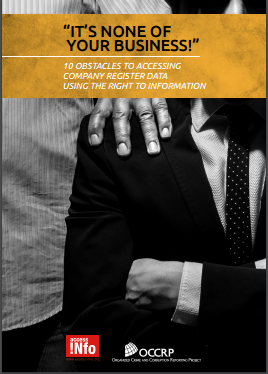
It’s none of your business! - Access Info & OCCRP
In the wake of the massive Panama Papers scandal, Access Info Europe and the Organized Crime and Corruption Reporting Project (OCCRP) have released a report showing that in most European jurisdictions data on company ownership is almost impossible for the public to obtain. The report identifies a total of 10 obstacles to accessing company register data.
The first obstacle is getting a response to information requests. In 5 out of the 32 jurisdictions surveyed, the authors did not receive any response to their requests, despite multiple attempts following up and even phone calls to the public authority concerned.
Two of the 32 jurisdictions surveyed do not have a freedom of information law, meaning that there was no legal framework for appealing refusals to provide information. In Denmark, although the company register database can be freely downloaded and in open format, you need a Danish electronic ID number to download the database, which means that non-residents or foreigners cannot access it.
However, the main obstacle for an investigative journalist tracking down money laundering or organized crime, is financial: the register can be obtained for prices ranging from €75,000 in the Netherlands to € 286,000 in Estonia; single record costs range from €2.33 in France to €767.00 in Russia.
European Union rules on access to public sector information mandate that fees shall be equal for all users but not that there shall be no fee. As a result, key actors in society, in particular investigative journalists and human rights organizations, find it hard to access the data as the costs are prohibitive.
In addition to the cost considerations, a further obstacle is a widespread concern about the need to protect personal data when it comes to the names of those company owners contained in the company registers.
This research found that the legal frameworks of the countries that we surveyed have failed to apply the fundamental right of access to information to the data contained in company registers. The potential conflict between the access to information laws and the specific company laws has not been worked out by legislators, information commissioners nor courts.
Some specific recommendations are contained in this report, addressed at particular countries.
Adapted from the report's presentation, available here .
Tags: Access to information Investigative journalism Media freedom EU Member StatesThe content of this article can be used according to the terms of Creative Commons: Attribution-NonCommercial 4.0 International (CC BY-NC 4.0) . To do so use the the wording "this article was originally published on the Resource Centre on Media Freedom in Europe" including a direct active link to the original article page.

